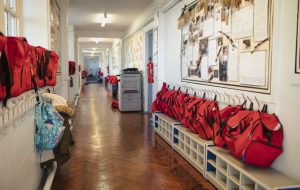
Supporting you to inspection day and beyond!
The Ofsted inspection framework has a focus on ‘substance of education’, and an emphasis on more involvement for classroom teachers, among other things.
Schools may be left unsure how inspection framework translates into inspection day: but this doesn’t have to be so daunting once you have completed the School Inspection Framework Specialist Certificate. Our unique online course is designed to support you with every step of the changes and requirements of school inspections.
Hide Info
How does it work?
- Our unique system will let you work through this specialist training programme at your own pace
- You’ll be able to test your knowledge along the way with quizzes and tests to identify gaps in your knowledge
- Hear from our wide range of education experts and inspection specialists
- Access to a wide range of current tools, templates, checklists and policies that you can download and start using straight away
Agenda
- Module 1
The new regulatory framework
- Changes to Common Inspection Framework (CIF to EIF)
- School accountability
4 key areas of inspection (‘outcomes’ for pupils removed) - Overall effectiveness
- Focus on the curriculum and the quality of education
- Ofsted risk assessments
- Inspection frequency and notice period
- Schools causing concern
- Ofsted mythbusters
- Module 2
Quality of education
- A leading judgment
- Inspecting the curriculum
- Intent
- Implementation
- Impact
- Measuring outcomes
- Curriculum inclusion
- Grade descriptors for quality of education
- Module 3
Behaviour and attitudes
- Attitude to learning
- Behaviour
- Exclusions
- Attendance
- Bullying
- Grade descriptors for behaviour and attitudes
- Module 4
Personal development
- Spiritual, moral, social and cultural development
- Fundamental British values
- Careers guidance
- Healthy living
- Citizenship
- Equality and diversity
- Preparation for next stage
- Grade descriptors for personal development
- Module 5
Leadership and management
- Vision and mission statement
- Culture
- Teacher CPD
- Teacher retention
- Teacher workload
- Attendance, exclusion and ‘off-rolling’
- Engaging with stakeholders
- Grade descriptors for Leadership and Management
- Module 6
Curriculum depth and breadth
- What is the curriculum?
- A broad and balanced curriculum
- Identifying end-points
- Identifying starting points
- Planned and sequenced
- Ambitious curriculum
- Module 7
Self-evaluation and improvement planning
- Rewriting your self-evaluation statement (SES)
- Worked example self-evaluation statement
- Developing an agenda for improvement
- Linking CPD to school improvement and allocating resources
- Self-evaluating your school to drive improvement
- Using Ofsted inspection criteria
- Demonstrating effectiveness to Ofsted
- Getting to outstanding
- Module 8
Preparing for inspection
- Previous inspection report
- Conduct of inspectors
- Preparing staff for inspection
- Preparing governors for inspection
- What evidence inspectors will require
- Parent View
- Pupil Premium Funding
- Displaying information on the school website
- Notice of inspection
- Request for deferral of inspection
- Module 9
Inspection day and beyond
- Meeting with school leaders
- Meeting with governors
- Lesson observation
- Pupil observation
- Work scrutiny
- Post-inspection evaluation
- Concerns and complaints
- Draft inspection report and factual accuracy
- Next steps
- Module 10
Education Inspection Framework in different contexts
- Evaluating early years provision (attached to schools)
- Grade descriptors for early years
- Evaluating sixth form provision
- Grade descriptors for sixth form
- Evaluating Junior, middle and studio schools
- Evaluating Special schools, PRUs and alternative provision
- Evaluating non-association independent schools
- Module 11
Safeguarding and inspection
- Background and key documents
- Keeping children safe in education
- Ofsted framework 2019
- Changes to the Ofsted framework
- What else have Ofsted said
- Staff wellbeing
- Module 12
Ofsted updates for 2021/2
-
 Matt BromleyEducation Advisor, Bromley Education
Matt BromleyEducation Advisor, Bromley Education
- Introduction
- Video 1: The Ofsted Annual Report: What can we learn? (part one)
- Video 2: The Ofsted Annual Report: What can we learn? (part two)
- Video 3: Changes to the inspection handbook for 2021/22
- Video 4: Changes to the inspection of the pupil premium part 1
- Video 5: Changes to the inspection of the pupil premium part 2
- Module 13
SEN and Inspection
-
 Samantha GarnerConsultant & Trainer
Samantha GarnerConsultant & Trainer
- Data uses and sources
- Ofsted overview
- Tips on developing an effective action plan
- School Information Report and SEN Policy – overview
- Module 14
Attendance and Inspection
-
 Joanne SierzegaCentral School Attendance and Welfare Service
Joanne SierzegaCentral School Attendance and Welfare Service
- Ofsted and attendance
- Notification and preparation
- Behaviour and attitudes
- Leadership and management
- AP PRUs Early Years Sixth Forms
- Module 15
Inspecting Early Years in schools
-
 Sue CowleyAuthor, Presenter and Trainer
Sue CowleyAuthor, Presenter and Trainer
- Introductio
- How Ofsted evaluate early years education in schools
- Evaluating the quality of early years education in schools
- Building a curriculum in the EYFS
- The definition of ‘teaching’ in EYFS
- Grade Descriptors for EYFS
- Module 16
What to expect in different types of early years setting
-
 Sue CowleyAuthor, Presenter and Trainer
Sue CowleyAuthor, Presenter and Trainer
- Introduction
- Different types of early years settings
- The EIF in maintained nursery schools
- The EIF and teaching of reading
- Inspection of provision for 2 and 3 year olds
- EYFS in the Pandemic
- Ofsted updates and Myth Busting for the EYFS
Speakers

David Birch
David is a former secondary headteacher and now a school improvement adviser and consultant. Until recently he was an associate director of the National Education Trust and much of his recent work with them has focused on the impact of the Pupil Premium on improving outcomes for disadvantaged students.
He was a school improvement partner in the south-west and continues to provide regular support to several schools, carrying out curriculum and leadership reviews, coaching and mentoring, and supporting Governors in the appointment of new Headteachers. He contributes regularly to conferences and training events and writes for ‘School Inspection and Improvement’ magazine.
He leads CPD and works with schools on whole school literacy and English; he is a senior A Level English Literature examiner and approved subject expert for Ofqual for whom he has worked on examination accreditation and standards over time.
Email: birch_david@outlook.com
Twitter: @birch_david

Joanne Sierzega
In October 2015 after almost 16 years of working for and in turn managing a Local Authority Education Welfare I with two partners established CSAWS (Central School Attendance and Welfare Service ltd.) CSAWS is a team of proactive, passionate and committed Education Welfare Officers. We are committed to achieving better outcomes for children by securing regular attendance at school. We understand that the reasons behind non-school attendance can be varied and complex. We offer both strategic and casework interventions. We provide support to schools and settings to identify and improve school attendance including reviewing, refining and advising on school approaches and processes. We develop clear action plans for and with schools through thorough data analysis and attendance reviews.

John Viner
John Viner has taught in both primary and secondary schools, with a long history of successful primary school leadership. He is now a full-time writer, inspector and adviser.

Matt Bromley
Matt Bromley is an education writer and advisor with over twenty years’ experience in teaching and leadership including as a secondary school headteacher and principal, FE college vice principal, and MAT director. He also works as a public speaker, trainer, and school improvement lead, and is a primary school governor.
Matt writes for various newspapers and magazines, sits on SecEd’s editorial board and co-hosts their podcast. He is the author of numerous best-selling books for teachers and his education blog has been voted one of the UK’s most influential.
He regularly speaks at national and international conferences and events, and provides education advice to charities, government agencies, training providers, colleges and multi-academy trusts. He works as a consultant and trainer with several companies and also provides a wide selection of direct-to-market consultancy and training services through his own company, Bromley Education, which he founded in 2012.
Matt has worked at senior levels in the public and private sectors and, prior to teaching, was a senior manager in the telecoms industry. He began his working life in newspaper journalism. He has an Honours degree in English Language and Literature, a Post-Graduate Certificate in Education and the National Professional Qualification for Headship, as well as several professional qualifications.

Samantha Garner
Samantha Garner is a well-established consultant and trainer in the world of SEN, Access Arrangements and Mental Health. Originally a music teacher, she has worked in the SEN arena for over 15 years and spent time in a large secondary school where she set up a specialist behaviour unit. After this time she qualified as a CBT therapist and child and adolescent counsellor. Sam has trained and consulted in the whole spectrum of educational establishments from PRUs to very prestigious private schools. She is a published author of several mental health support programmes and regularly writes for SEN magazines.

Sue Cowley
Sue Cowley is a writer, presenter, teacher educator and author of 30 books on education. After qualifying as an early years teacher with a first class BEd (Hons), she taught into primary and secondary schools and overseas. Sue’s international bestseller Getting the Buggers to Behave has been translated into ten languages and is a set text at many universities. Her best selling guide for NQTs How to Survive your First Year in Teaching has been in print for 20 years.
Sue has written articles and columns for numerous education publications, including the TES, Teach Primary, Early Years Educator and Nursery World. She was a regular presenter on Teachers TV and has featured in numerous education videos. She now works internationally as a teacher trainer and presenter.
Sue has been part of the management team at her local preschool for the last ten years, and over that time has helped the setting move from a ‘Satisfactory’ Ofsted grading to an ‘Outstanding’ one. Her latest books are The Ultimate Guide to Differentiation and The Ultimate Guide to Mark Making in the Early Years published by Bloomsbury.
Related Products
-

- Distance Learning
- Distance Learning
Outstanding Early Years Management: Virtual toolkit
-

- Distance Learning
- Distance Learning
Managing Health and Safety in Schools: Virtual toolkit
-

- Distance Learning
- Education
Headteacher’s PA Specialist Certificate (Level 1 & 2)
-

- Distance Learning
- Education
Designated Safeguarding Lead Specialist: Virtual toolkit
